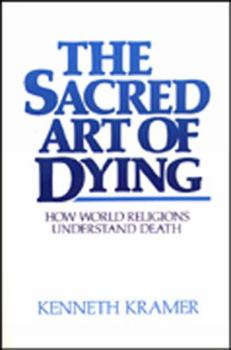The Sacred Art of Dying: How the World Religions Understand Death
Examines how each of the major religions looks at death by including stories, teachings, and rituals that present a comparative religious meaning of death and afterlife. Written in textbook style with journal exercises at the end of each chapter. +
Format:Paperback
Language:English
ISBN:0809129426
ISBN13:9780809129423
Release Date:January 1988
Publisher:Paulist Press
Length:232 Pages
Weight:0.73 lbs.
Dimensions:0.5" x 6.0" x 8.9"
Related Subjects
Christian Books & Bibles Comparative Religion Death & Grief Education & Reference Grief & Bereavement Inspirational Other Religions, Practices & Sacred Texts Parenting & Relationships Religion Religion & Spirituality Religious Studies Rites & Ceremonies Ritual Spirituality Theology Worship & DevotionCustomer Reviews
2 ratings
A good start, but...
Published by Thriftbooks.com User , 15 years ago
I'm really quite torn when it comes to making a judgment about this book because I feel that anything critical I have to say about it needs to be highly qualified in reference to this book's strengths. I had better start with the strengths then. This is the premier, affordable, death and dying textbook. To the best of my knowledge you will not be able to find a survey of world religion's views of death and dying for under $15. This is really an accomplishment that deserves no small amount of credit and one that you have to acknowledge. If you are looking for a good place to start on this topic, here it is. However, I have some concerns with this book that need to be mentioned. The first issue is that at times it is exceedingly evident that the author is by far an expert in every religious sub-discipline. Honestly, it would be a monumental accomplishment to pull off that degree of authenticity in a single-author survey of any sort, especially when covering a field as diverse as "religion." Nonetheless, the author doesn't deliver in a few chapters, such as the Judaism and Greek chapters. To further explain, such chapters do not appear to be very well organized. This is both in the sense of organization and assembling material. For example, the organization leaves much to be desired in the Hinduism chapter. In my opinion, some core philosophy, which is brought up later on, needs to be moved to the front to better frame the elucidation of death. I feel that more immediate personal and social issues are addressed with the philosophy pushed to the periphery, but due to Hinduism's nature, I do not think this is a very good approach. Concerning the assembly of material, some chapters seem loosely tacked together, such as the Judaism chapter. It is as if the author found four or five references to death and dying and made them the key points of the chapter. But, seemingly little care is spent explaining how the ideas link up with each other. At times, the cracks between the pieces are glaring. But again, in this case, I must give the author credit as Judaism has a VERY ill-defined view on death, so any attempt at breadth will ultimately appear eclectic. In both cases, it is made quite evident that the author is far from an expert in all fields of religion, which tends to make this book appear a little superficial and may frustrate the reader. The only other book I would consider on this topic is Bregman's anthology, "Death and Dying in World Religions," but its weaknesses are Kramer's strength. For example, as the Bregman book is an anthology, its tones, perspectives and writing styles vary quite a bit whereas Kramer is very consistent. Also, some authors in the Bregman book make assumptions about the reader's degree of exposure to the religion at hand, whereas Kramer is rather thorough with filling in of background information. One last complaint of mine is the use of pictures in Kramer. They seem quite out of place and oftent
Kramer's course
Published by Thriftbooks.com User , 19 years ago
I had the luxery of not only reading Kramer's book, but also took a course along with it. Kramer taught for a short time at San Jose State University, Death Dying & Religion. Of course, being the source of a book, it was intreguing to hear his arguments and views about each religion. Kramer describes in detail the geographical location of each religion and how similar each religion is, and how it ties in the same very locations that each religion has, with their own interpretations. I decided to look up his book, simply because I saw a Barbara Walters special on Heaven, which reminded me of Kramer's course. This book is definitely a text book, but if you have any questions on why so many countries hate America based on their religions, perhaps we can better understand them but comparing them to your own views on religion. Even within the Christian religion, the differences are there. History runs high even amongsts Buddhists and it's sister religions. I do recommend this as a book to read.






